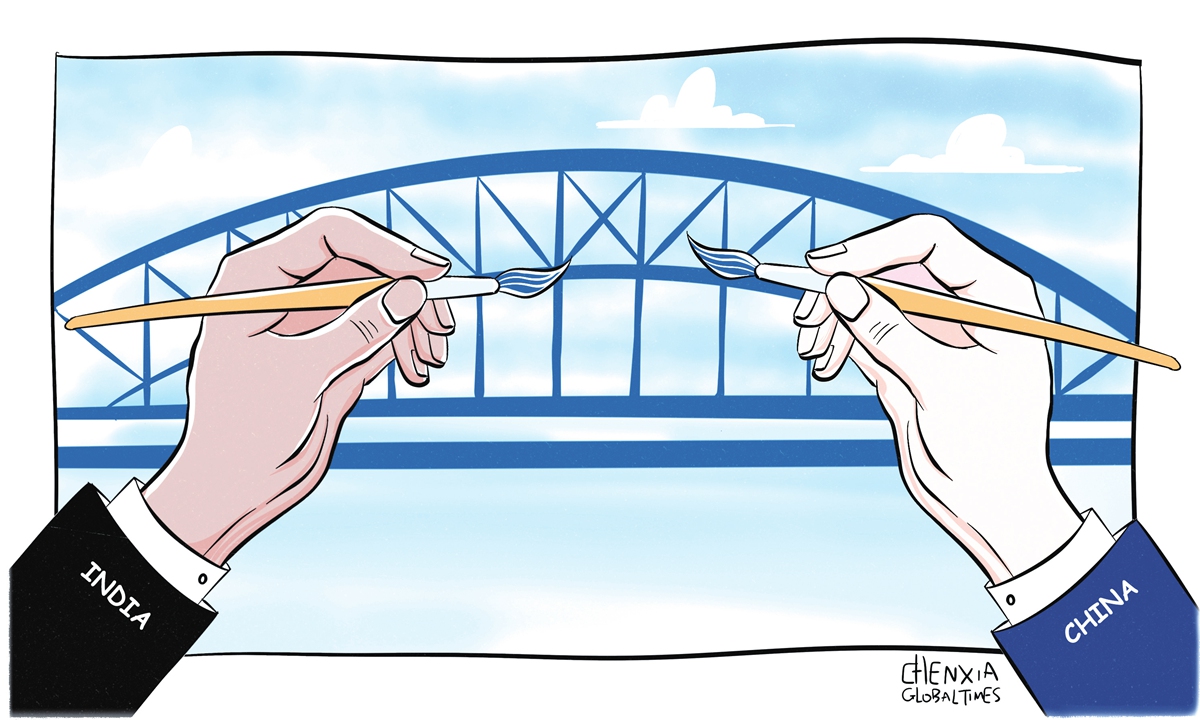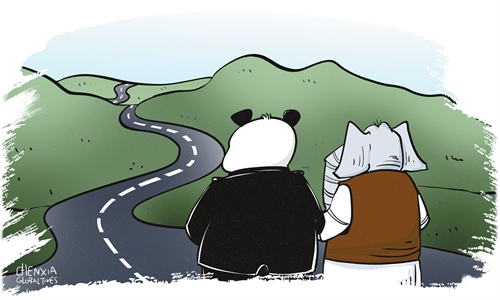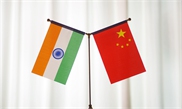China, India should look at each other with new eyes, open minds: Indian scholar

Illustration: Chen Xia/GT
Editor's Note:
As China and India celebrate the 75th anniversary of the establishment of diplomatic relations in 2025, both nations have demonstrated a renewed commitment to enhancing bilateral ties. Recent interactions and remarks between Chinese and Indian officials indicate a growing momentum to foster cooperation and understanding. Against this backdrop, Indian scholar Sudheendra Kulkarni (Kulkarni), a close aide to former Indian prime minister Atal Bihari Vajpayee and the founder of the Forum for a New South Asia, shared his insights into strengthening cooperation and mutual trust between the two countries in a recent interview with Global Times (GT) reporters Xia Wenxin, Bai Yunyi and Xu Jiatong.
GT: In November 2024, you spoke with us and shared an interesting metaphor regarding the development of India-China relations, describing it as the "process of cultivating a plant." What stage are we currently at in this process, and what can we expect in the near future?
Kulkarni: The interview you mentioned took place in November 2024, at a time of significant breakthroughs in our relations. Just weeks earlier, Indian Prime Minister Narendra Modi and Chinese President Xi Jinping had met in Kazan, Russia, on the sidelines of the BRICS Summit. That meeting led to an important shift in our bilateral relations.
Over the last four months, we've witnessed several positive developments - signs that the seeds of friendship sown in the fertile soil by both sides are beginning to sprout. We can already see some very hopeful green leaves. In time, these will grow and we are going to see fruits. However, this process must be accelerated.
Some important agreements were reached when Indian Foreign Secretary Vikram Misri visited Beijing earlier this year and met with Chinese Foreign Minister Wang Yi and other officials. We can expect even more promising agreements in the days to come.
GT: You mentioned recent positive signals from both sides. One notable statement came from Foreign Minister Wang Yi, who said that "a cooperative pas de deux of the dragon and the elephant is the only right choice for both sides." What are your thoughts on his remarks? Do you believe this "dance" will endure?
Kulkarni: His statement is absolutely correct. India and China are two large Asian nations and the only two in the world with populations of more than a billion. We cannot be confrontational with each other. Certainly, we are not enemies; we are not threats to each other. The only option we have is to partner with each other and help in each other's development. Besides, we have a responsibility to the world to create a new world order that is equitable, fair, and just for all. That is why I fully support Minister Wang's statement.
GT: This year marks the 75th anniversary of our diplomatic relations. Looking back, what lessons can we draw from the last 75 years to guide our future?
Kulkarni: In 1950, India became the first non-socialist country to establish diplomatic relations with the People's Republic of China. Even during the anti-imperialist war, India supported China in its fight against Japanese aggression. If we examine history, we see that we have supported you and vice versa. China has also shown its support for our struggle against British imperialism.
In these 75 years, there have been some ups and downs. We have encountered some problems that have been inherited from the past, from British imperialism. It has been difficult to solve these problems, but these are not problems that we cannot surmount.
But overall, we are moving ahead, and the era of extreme tension between India and China is behind us. It is not going to come back. I am absolutely sure that India and China are not going to repeat that painful period in our recent history.
GT: Why are you so certain that tensions between our two countries belong to the past and will not resurface?
Kulkarni: I would like to draw your attention to a very important interview that Prime Minister Modi gave recently. In a long podcast, he was asked about India-China relations, and he said "If we look back centuries, there's no real history of conflict between us… Our relationship should remain just as strong in the future." He made a second important point that "even within a family, not everything is always perfect." Please pay attention to his choice of words - he said "within a family," which implies that India and China are like family. The third point he made is that everybody regards the 21st century as "Asia's century," and this can only be realized with India-China cooperation.
So my optimism about the future is that we have very wise leaders when it comes to India-China relations. Prime Minister Modi and President Xi have met nearly 20 times and know each other well. As for the people, in India, where much of the misinformation comes from the Western media, the common people are beginning to admire China more and more. That is why I am absolutely optimistic that the future is not one of conflict. The future is one of cordiality.
GT: In our previous interview, you mentioned that we should "identify maximum points of commonness and convergence between the Chinese Dream and the Indian Dream." In your opinion, what are the greatest areas of commonality between our two nations? And how can they drive closer bilateral cooperation?
Kulkarni: The common points of the Chinese Dream and the Indian Dream are obvious: To ensure that our people live well and all their basic needs are taken care of. Both governments have a responsibility to eliminate hunger and poverty, ensure access to good education and healthcare, and preserve a clean environment. Now in some respects, China has done better, and we should learn from each other.
A prosperous and strong China is something that we admire. We greatly admire the fact that China has come up so fast and become a leader in technology today. In India, I can tell you that more and more people, especially young people, are beginning to admire China's achievements in technological developments, from DeepSeek to BYD. They are also paying close attention to China's achievements in many other areas.
Overall, we should begin to look at each other with new eyes and open minds, fostering stronger bonds of cooperation. By doing so, we can contribute to the realization of both the Indian Dream and the Chinese Dream.
That said, there is one urgent issue between India and China that needs to be addressed: the trade deficit. China is India's largest trading partner, yet the trade deficit has reached more than $85 billion and continues to grow. For a stable relationship, such a large deficit is unsustainable and undesirable. When there is less of a trade deficit, it will also reduce the trust deficit. Ultimately, the most important thing between India and China is that we should reduce the mistrust and contribute to greater trust.
GT: Let's discuss the evolving global landscape. Both India and China face tariff threats from the new US administration, whose "America First" doctrine has raised concerns about the future of global stability. How do you view the US administration's impact on China, India, and our bilateral relations?
Kulkarni: Every country wants to become great, but the time has come when we should talk about making humanity and the world great. We need leaders in the world who speak for the welfare and progress of all the countries in the world, especially small and underdeveloped ones. That is the only yardstick of greatness.
If the world becomes more and more fragmented, with coercion and threats from major powers, smaller nations will understandably get worried. Against this backdrop, it becomes even more important for India and China to come closer. India and China have a huge responsibility to add to the stability and peace of the world and ensure progress. We are required to work together to chart a new path for the world.
President Xi's vision of "building a community with a shared future for mankind" aligns with this responsibility. Similarly, Prime Minister Modi draws from an ancient Sanskrit philosophy, "Vasudhaiva Kutumbakam," which means "the whole world is one family." These are the teachings of Indian and Chinese civilizations.



